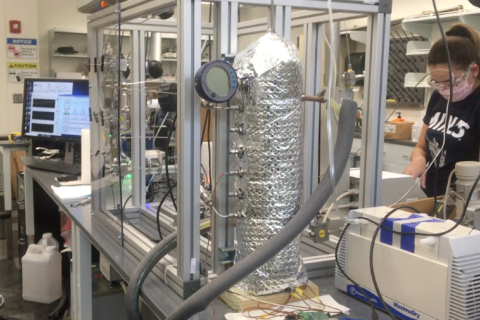?
BreitBurn Energy Partners LP, Los Angeles, (Nasdaq: BBEP) says allegations in a lawsuit filed Oct. 31 by stakeholder Quicksilver Resources Inc., Fort Worth, Texas, (NYSE: KWK) are without merit and the MLP intends to defend itself vigorously.
Quicksilver filed suit Friday in Tarrant County, Texas, naming BreitBurn, several BreitBurn-related entities, BreitBurn former unit-holder Provident Energy Trust, Calgary, (NYSE: PVX) and co-chief executives Randy Breitenbach and Hal Washburn. The suit alleges the subsequent sale of Provident’s stake was not part of the deal when Quicksilver sold assets to BreitBurn last year and took back units as part of the purchase, and that BreitBurn has since tried to silence Quicksilver through corporate maneuvering.
Quicksilver is seeking compensation for damages, and expanded rights in electing BreitBurn directors.
BreitBurn claims it was unaware of any concerns by Quicksilver regarding the relationship prior to receiving the notice of the lawsuit.
The legal action stems from a November 2007 deal in which Quicksilver acquired a 32% interest in BreitBurn as partial compensation for its sale of Antrim and New Albany shale assets in Michigan, Indiana and Kentucky in a deal valued at $1.45 billion.
In June, BreitBurn bought Provident’s 22% stake in the MLP and cancelled the units, raising Quicksilver’s interest to 40%. The MLP also acquired Provident’s 96% interest in the MLP general partner, BreitBurn GP LLC, and the remaining 4% owned by BreitBurn Energy Corp., a private company owned by Washburn and Breitenbach.
Quicksilver reports that it relied on statements by BreitBurn “that the benefits of BreitBurn’s relationship with Provident were a ‘significant attribute’ and were integral to its business strategy. Shortly after…, Provident and BreitBurn informed Quicksilver Resources for the first time that Provident was contemplating the liquidation of its entire interest in BreitBurn.”
BreitBurn says it believes its representation of the contribution agreement in which Quicksilver acquired its units was accurate.”
Additionally, Quicksilver claims BreitBurn amended its partnership agreement, limiting Quicksilver’s voting rights to half of the per-unit voting strength of BreitBurn’s other limited partners and included other provisions restricting Quicksilver’s ability to replace the directors of BreitBurn GP. Also, Quicksilver alleges BreitBurn eliminated the general partner economic interest without offering Quicksilver or other limited partners the opportunity to vote on these transactions.
BreitBurn responded that at the time Quicksilver acquired its BreitBurn common units, limited partners did not have the right to elect members of the board of the general partner of BreitBurn.
BreitBurn adds that all of these transactions were approved by the conflicts committee of the board of the general partner of BreitBurn, which is comprised of independent directors.
Quicksilver alleges the BreitBurn management buyout of Provident was “at a premium” and advanced Breitenbach and Washburn’s “own personal interests at the expense of Quicksilver.”
BreitBurn responds that before it acquired its general partner, Washburn and Breitenbach owned a small indirect interest in the general partner, giving them partial control and the right to receive distributions. As part of BreitBurn’s purchase, Washburn and Breitenbach exchanged their indirect interest in the general partner for BreitBurn common units at the same price paid to Provident, which they still hold, while Provident received cash.
J.P. Morgan Securities was financial advisor to Quicksilver in the 2007 deal, and Credit Suisse was financial advisor to BreitBurn. The deal received an Oil and Gas Investor Excellence Award for “M&A Deal of the Year, 2007.”
Recommended Reading
Going with the Flow: Universities, Operators Team on Flow Assurance Research
2024-03-05 - From Icy Waterfloods to Gas Lift Slugs, operators and researchers at Texas Tech University and the Colorado School of Mines are finding ways to optimize flow assurance, reduce costs and improve wells.
Exclusive: Silixa’s Distributed Fiber Optics Solutions for E&Ps
2024-03-19 - Todd Chuckry, business development manager for Silixa, highlights the company's DScover and Carina platforms to help oil and gas operators fully understand their fiber optics treatments from start to finish in this Hart Energy Exclusive.
CERAWeek: AI, Energy Industry Meet at Scary but Exciting Crossroads
2024-03-19 - From optimizing assets to enabling interoperability, digital technology works best through collaboration.
Cyber-informed Engineering Can Fortify OT Security
2024-03-12 - Ransomware is still a top threat in cybersecurity even as hacktivist attacks trend up, and the oil and gas sector must address both to maintain operational security.
Forum Energy Signs MOU to Develop Electric ROV Thrusters
2024-03-13 - The electric thrusters for ROV systems will undergo extensive tests by Forum Energy Technologies and SAFEEN Survey & Subsea Services.





